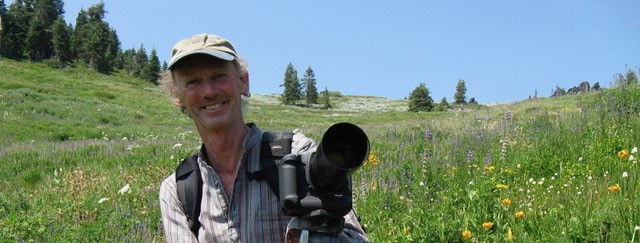When someone as full of life as Bob leaves us, and before his time, there is a profound sense of shock. Writing a week after his death, from a long illness, on 25th May, I can still hardly take it in. As many readers of British Wildlife will know, Bob was a talented wildlife photographer, without doubt one of the best of his generation. He was also a great traveller, on photographic forays and as leader of his tour company, Natural History Travel. On top of that he wrote over forty books, on photography, on wild flowers, insects, wildlife gardens and wildlife landscapes, and more than forty articles for this magazine, mostly for the Reserve Focus series. I knew him well and I still do not know how he found the time. And bear in mind that he did it all with one arm. He lost his left forearm in a childhood firework accident.
How does one describe Bob? He was a lifelong vegetarian, as thin as a rake. He was very fit. He was a racquets champion at Durham University, and I remember him walking 80 miles non-stop for charity without breaking sweat. He was very quick-witted, never short of a pun or witticism. His knowledge was exceptional. He could name any plant in Europe, for instance. Bob really loved plants, and on occasion I caught him actually talking to them (‘Oh, you’re a lovely little thing, aren’t you?’). But he was equally omniscient about animals, birds and insects, wherever he was – in the Alps, or his beloved Peloponnese or Transylvania, or farther afield in Newfoundland, California, Costa Rica, Namibia or the Galapagos.
At school, at Millfield in Somerset, he had been accelerated and would have taken his A-levels at 13 if he hadn’t blown himself up with the firework. Originally intending to study languages (Bob was quite fluent in French), a friendly teacher inspired him to switch to biology. Bob graduated at Wye College in Kent, specialising in ecology. I first met him at Durham University, where we were both studying the rare flowers of Upper Teesdale. He got his doctorate, and I didn’t. Even then, aged 25, he had organised a six-month botanical expedition to Afghanistan, and another to Nepal, the latter resulting in his book, The Himalayan Kingdoms (1983). He also ran a summer course for adult education, pond-dipping and orchid-hunting on the Durham magnesian limestone. And he had already married Liz, a fellow student at Wye, and was father of a baby son.
Bob got his first job as conservation officer for the Cheshire Wildlife Trust, and then as Hampshire officer in the Nature Conservancy Council, working with the redoubtable Colin Tubbs. He broke free in 1985, and was self-employed for the rest of his life. Bob had already established his own photographic agency, and set up his travel company in alliance with Sunvil Holidays. He organised around six or seven trips a year, each lasting around a fortnight, and led them all himself. The amount of sometimes stressful work involved was formidable, and there are so many things that can go wrong: airport delays, road closures, bad weather, injuries. Fortunately, Bob was blessed with an inner calm. His enthusiasm was catching, and he never needed to advertise. His bookings were often filled in days, and, because people returned again and again, it came to feel like an exclusive travel club among friends. Days in the field were followed by an excellent supper and an evening review of the highlights of the day. Bob was a naturally generous and communicative soul. Apart from doing most of the spotting, he could also offer tips on photography, and he had an apparently bottomless knowledge of each area. He kept it up for 25 years, until 2022.
As for the photography, what can I say? I have been on many photographic excursions with Bob at home and abroad, and I still don’t really know how he did it. His ecological training helped: he liked to show a plant in its place. Of course, he had the right equipment and was well up on technique. He had the patience to wait for the right light, or for the wind to drop. But there was something else which I can categorise only as genius. He could see the picture even before he set up his camera.
Bob was working on a Princeton WildGuide on the alpine flowers of Europe for the past three years. It should be out later this year, as a fitting legacy. He will be remembered by his many friends as an exceptional person, gifted, generous, amusing, indomitable. He will be greatly missed.

